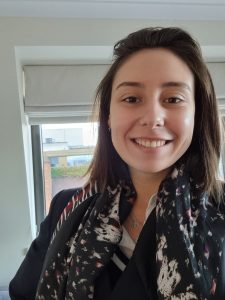Raluca Gaina, current student and student representative for MSc Environmental Data Science and Machine Learning (Department of Earth Science and Engineering)
As a current student in the recently launched MSc in Environmental Data Science and Machine Learning, I’ve been asked many questions about what I’m learning in the programme and how I will use this knowledge throughout my career path (my aim is to work in the industry and apply data science and machine learning to climate-related topics). Whether you decide to do a PhD or whether you decide to work in the field, here are the top five skills I’ve learned while doing this course!
Technical
This programme combines environmental science, data science and machine learning, three topics that I found very interesting and useful for my career path. I came into this programme with a background in economics and statistics, looking to learn skills related to environmental science (which I most certainly developed during the Environmental Data module) and expand my current knowledge. The beautiful aspect of this programme is we all develop our technical skills together, regardless of background. You might have done your undergraduate degree in Geology and want to enhance your coding and computational skills, or you might have done Computer Science and want to apply your knowledge to environmental-related topics – this programme will prepare you for a career that focuses on climate science, data science or machine learning!
Problem-solving
One of my favourite aspects of this course has been the application of theoretical concepts and knowledge through a real-world lens. In the Environmental Data module, we often work with scenario-driven prompts, which ask us to explore and analyse climate projections and develop strategies for hypothetical clients that are concerned with various climate phenomena, like increasing flooding risk or temperatures and comment on the impact of those on their business. I think that this skill is extremely important in our future careers, especially when the field of environmental science and climate change aims to answer such challenging and interesting questions!
Communication
Everybody says communication is key, and I must admit it is not always easy to present your ideas and thoughts in a simple, concise and yet comprehensive way. We communicate daily with our peers and our lecturers through presentations to the whole class or through mini-projects, which can range from 5 minutes to 15 minutes presentations, which help ease us into the habit of speaking clearly and getting our points across. How will this help in your future career? I think that no matter the job or position, being an effective communicator will help with meetings, pitches, presentations and overall relationship-building with colleagues.
Creativity
In my opinion, one of the key requirements in this course is to stay curious and always ask yourself ‘how would I solve this problem?’. To tackle complex climate-related issues, we need to use our creativity and not be afraid to try many different options to develop great ideas. In my own work and projects, I have tried to explore different ways of structuring my code in Python to make it more efficient, different formulas and algorithms that would provide me with the most accurate and the fastest result and various visualisation techniques to present the audience with the clearest answer (do I present my findings on a map, as a chart, do I use animations to express change over time?)
Collaboration
I will end this post with one of my most valuable key lessons: collaboration. In our group projects, I am very proud and impressed with the quality of work, work that is possible given the members’ diverse backgrounds and different ways of thinking. In our Applying Data Science module, we have a week-long group project, where we work in groups of 6 or 7 students with different backgrounds (in my own groups, I have had colleagues with degrees in Physics, Environmental Science, Maths, Engineering, while my background is in Economics and Statistics) and who come from countries from all over the world, such as France, China and the UK. We can only achieve great results through collaboration and understanding of one another’s opinions and ideas.


